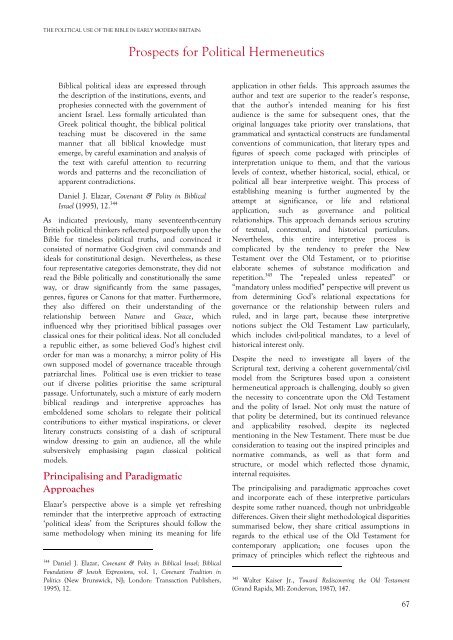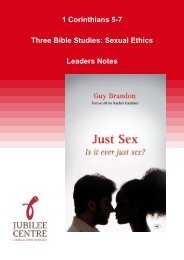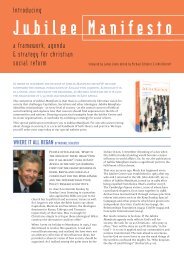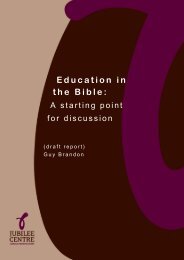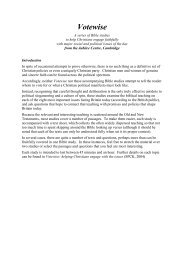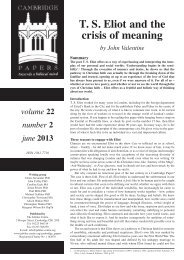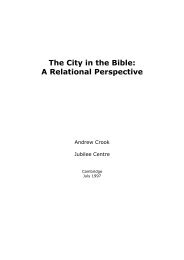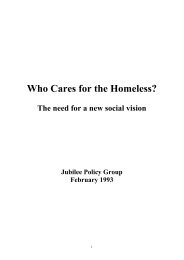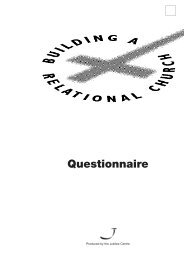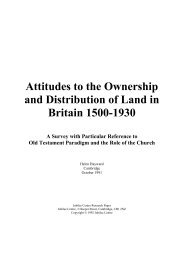Report Template - Jubilee Centre
Report Template - Jubilee Centre
Report Template - Jubilee Centre
You also want an ePaper? Increase the reach of your titles
YUMPU automatically turns print PDFs into web optimized ePapers that Google loves.
THE POLITICAL USE OF THE BIBLE IN EARLY MODERN BRITAIN:<br />
Prospects for Political Hermeneutics<br />
Biblical political ideas are expressed through<br />
the description of the institutions, events, and<br />
prophesies connected with the government of<br />
ancient Israel. Less formally articulated than<br />
Greek political thought, the biblical political<br />
teaching must be discovered in the same<br />
manner that all biblical knowledge must<br />
emerge, by careful examination and analysis of<br />
the text with careful attention to recurring<br />
words and patterns and the reconciliation of<br />
apparent contradictions.<br />
Daniel J. Elazar, Covenant & Polity in Biblical<br />
Israel (1995), 12. 344<br />
As indicated previously, many seventeenth-century<br />
British political thinkers reflected purposefully upon the<br />
Bible for timeless political truths, and convinced it<br />
consisted of normative God-given civil commands and<br />
ideals for constitutional design. Nevertheless, as these<br />
four representative categories demonstrate, they did not<br />
read the Bible politically and constitutionally the same<br />
way, or draw significantly from the same passages,<br />
genres, figures or Canons for that matter. Furthermore,<br />
they also differed on their understanding of the<br />
relationship between Nature and Grace, which<br />
influenced why they prioritised biblical passages over<br />
classical ones for their political ideas. Not all concluded<br />
a republic either, as some believed God’s highest civil<br />
order for man was a monarchy; a mirror polity of His<br />
own supposed model of governance traceable through<br />
patriarchal lines. Political use is even trickier to tease<br />
out if diverse polities prioritise the same scriptural<br />
passage. Unfortunately, such a mixture of early modern<br />
biblical readings and interpretive approaches has<br />
emboldened some scholars to relegate their political<br />
contributions to either mystical inspirations, or clever<br />
literary constructs consisting of a dash of scriptural<br />
window dressing to gain an audience, all the while<br />
subversively emphasising pagan classical political<br />
models.<br />
Principalising and Paradigmatic<br />
Approaches<br />
Elazar’s perspective above is a simple yet refreshing<br />
reminder that the interpretive approach of extracting<br />
‘political ideas’ from the Scriptures should follow the<br />
same methodology when mining its meaning for life<br />
344<br />
Daniel J. Elazar, Covenant & Polity in Biblical Israel; Biblical<br />
Foundations & Jewish Expressions, vol. 1, Covenant Tradition in<br />
Politics (New Brunswick, NJ; London: Transaction Publishers,<br />
1995), 12.<br />
application in other fields. This approach assumes the<br />
author and text are superior to the reader’s response,<br />
that the author’s intended meaning for his first<br />
audience is the same for subsequent ones, that the<br />
original languages take priority over translations, that<br />
grammatical and syntactical constructs are fundamental<br />
conventions of communication, that literary types and<br />
figures of speech come packaged with principles of<br />
interpretation unique to them, and that the various<br />
levels of context, whether historical, social, ethical, or<br />
political all bear interpretive weight. This process of<br />
establishing meaning is further augmented by the<br />
attempt at significance, or life and relational<br />
application, such as governance and political<br />
relationships. This approach demands serious scrutiny<br />
of textual, contextual, and historical particulars.<br />
Nevertheless, this entire interpretive process is<br />
complicated by the tendency to prefer the New<br />
Testament over the Old Testament, or to prioritise<br />
elaborate schemes of substance modification and<br />
repetition. 345 The “repealed unless repeated” or<br />
“mandatory unless modified” perspective will prevent us<br />
from determining God’s relational expectations for<br />
governance or the relationship between rulers and<br />
ruled, and in large part, because these interpretive<br />
notions subject the Old Testament Law particularly,<br />
which includes civil-political mandates, to a level of<br />
historical interest only.<br />
Despite the need to investigate all layers of the<br />
Scriptural text, deriving a coherent governmental/civil<br />
model from the Scriptures based upon a consistent<br />
hermeneutical approach is challenging, doubly so given<br />
the necessity to concentrate upon the Old Testament<br />
and the polity of Israel. Not only must the nature of<br />
that polity be determined, but its continued relevance<br />
and applicability resolved, despite its neglected<br />
mentioning in the New Testament. There must be due<br />
consideration to teasing out the inspired principles and<br />
normative commands, as well as that form and<br />
structure, or model which reflected those dynamic,<br />
internal requisites.<br />
The principalising and paradigmatic approaches covet<br />
and incorporate each of these interpretive particulars<br />
despite some rather nuanced, though not unbridgeable<br />
differences. Given their slight methodological disparities<br />
summarised below, they share critical assumptions in<br />
regards to the ethical use of the Old Testament for<br />
contemporary application; one focuses upon the<br />
primacy of principles which reflect the righteous and<br />
345<br />
Walter Kaiser Jr., Toward Rediscovering the Old Testament<br />
(Grand Rapids, MI: Zondervan, 1987), 147.<br />
67


